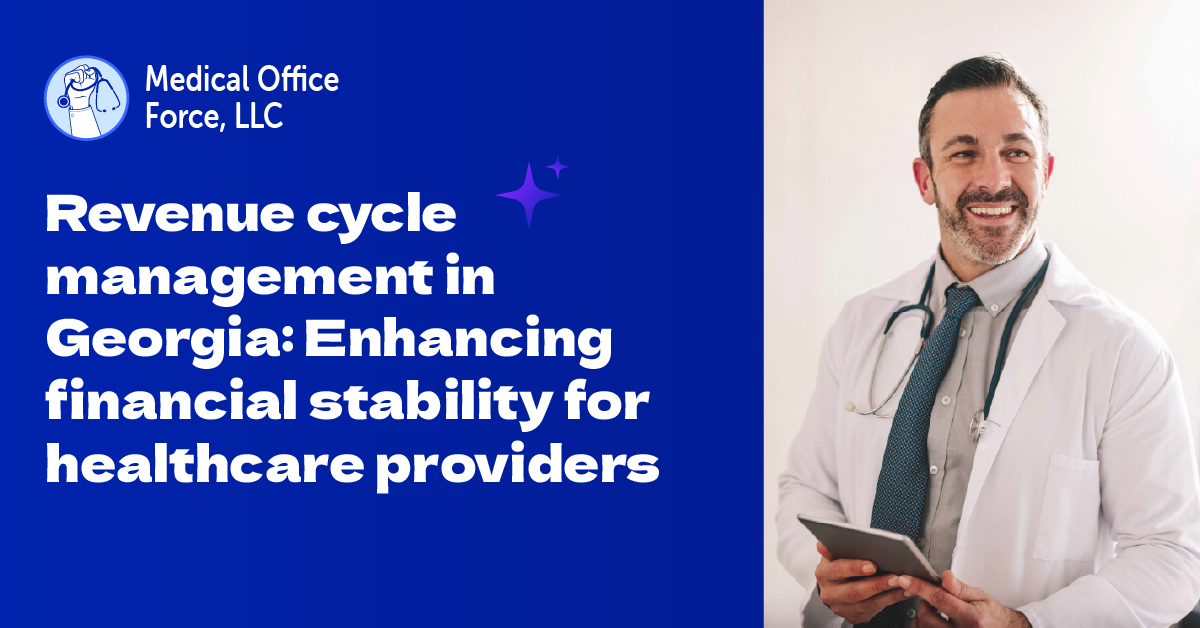
Revenue Cycle Management (RCM) is the backbone of a healthcare provider’s financial well-being. Effective RCM processes ensure that medical services are correctly billed and payments are collected in an orderly fashion. While the healthcare industry in Georgia is fast evolving, medical practices and hospitals must maximize their earnings and minimize claim denials by adopting advanced RCM strategies.
This blog will discuss the importance of RCM, the challenges faced by healthcare providers in Georgia, and best practices to optimize the revenue cycle.
Understanding Revenue Cycle Management
RCM is a comprehensive process that includes patient registration, insurance verification, coding, claims submission, payment collection, and denial management. The goal of RCM is to streamline financial transactions between providers and payers while guiding both through ensuring compliance with state and federal regulations. Learn more via our Exploring Revenue Cycle Management Services to Maximize Practice Revenue.”
The Georgia healthcare system is comprised of a mix of large hospitals, small clinics, and specialty practices. Each facility must navigate complex reimbursement policies, insurance regulations, and evolving healthcare reforms to maintain financial stability.

Challenges Faced by Providers in Revenue Cycle Management in Georgia
Healthcare providers in Georgia are faced with various challenges in their revenue cycle management including the following:
- Insurance and Payer Complexities
In Georgia, the payer landscape consists of Medicaid, Medicare, and private payers which have very different reimbursement rules. Understanding and coping with these policies is integral in minimizing claim denials.
- High Claim Denial Rates
This is a common problem for healthcare providers within the greater Georgia claims processing context. Denials may arise from incorrect coding or missing documentation with no prior authorization. Hence, effective handling of these denials is vital as it prevents losses in revenue. Check our Denial Management Services for solutions.
- Regulatory Compliance
Federal laws such as HIPAA and those pertaining to Georgia have to be complied with by all healthcare providers. Non-compliance can translate to fines and loss of patients’ confidence in the service.
- Patient Payment Problems
The increased out-of-pocket payment costs translate into hardships for many patients in Georgia regarding settling their medical expenses. Active and effective patient collection strategies must be implemented to maintain good cash flow. See our Patient Billing and Collection Solutions for support.
Best Practices for Optimizing RCM in Georgia
To overcome these roadblocks, healthcare providers should have in place all the above-mentioned best practices of RCM.
- Adopt Advanced RCM Software
Automated RCM solutions should be used since they make billing, coding, and claims transactions incredibly easy to do by eliminating errors and increasing efficiency.
- Ensure Accurate Medical Coding
Reducing claim denials is attributed to accurate coding. Consistent training of coders and strong AI coding tools usage are prerequisites to accuracy in coding. Read Maximize Reimbursements: 5 Proven Strategies to Minimize Claim Denials for best practices.
- Strengthen Denial Management Strategies
A robust denial management process should be in place by recognizing all kinds of patterns in the denials received, reporting mistakes, and resubmitting claims within minimum time. Explore Denial Management in Healthcare for expert guidance.
- Enhance Patient Payment Collections
Flexible payment plans, visible online payment channels, and straightforward billing statements will increase the chances of payments being made or collected quickly from patients. Check our Patient Billing Solutions for strategies.
- Outsource RCM Services
There are several healthcare providers in Georgia who engage third-party RCM service providers for the handling of their cumbersome billing and collections processes to streamline their revenue cycle.

The Role of RCM Service Providers in Georgia
Many organizations provide custom RCM services in Georgia that allow healthcare professionals to streamline their financial operations. Their services comprise billing, coding, denial management, and compliance. Outsourcing RCM has the potential to enhance revenue growth, decrease administrative expenses, and meet changing regulatory requirements.
Conclusion
Effective Revenue Cycle Management is crucial for healthcare providers in Georgia to maintain financial stability and deliver quality patient care. By leveraging advanced RCM solutions, improving denial management, and enhancing patient collections, providers can maximize revenue and streamline operations. Adapting to changing healthcare policies and partnering with RCM experts can further strengthen the financial health of medical practices across Georgia.
At Medical Office Force (MOF), we specialize in providing comprehensive RCM solutions tailored to the needs of healthcare providers in Georgia. Our expertise in billing, coding, and denial management ensures maximum revenue optimization and seamless financial operations. Partner with MOF today-Contact Us to streamline your revenue cycle and enhance your practice’s financial health.

